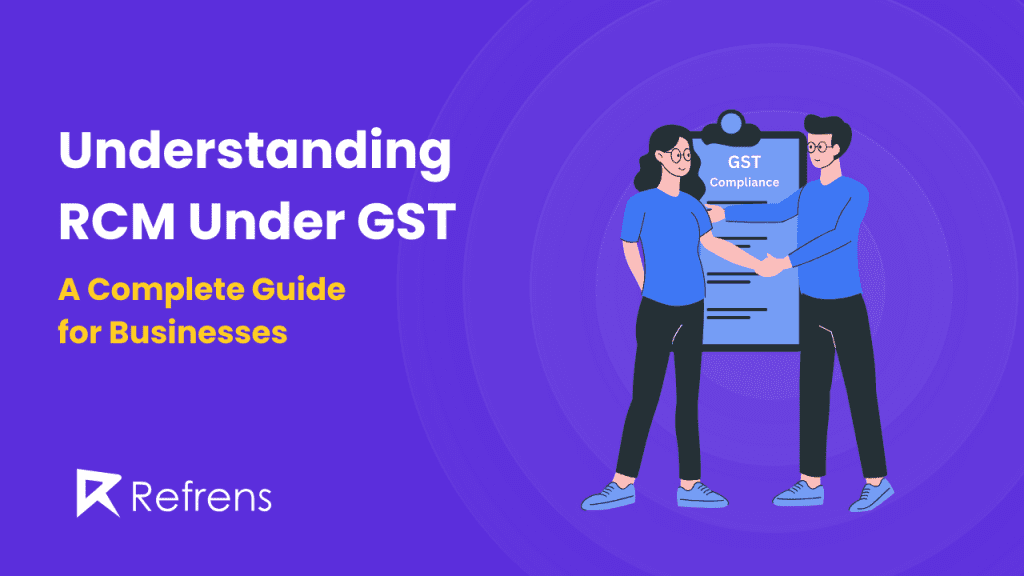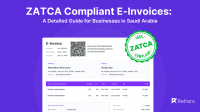The Reverse Charge Mechanism (RCM) is a key aspect of the GST framework that shifts the tax payment responsibility from suppliers to recipients in specific cases. This unique provision plays a critical role in sectors where tax compliance might otherwise be challenging, such as with unregistered suppliers, imported services, and certain specified industries.
Understanding RCM is essential for businesses to stay compliant, avoid penalties, and manage their tax liabilities effectively. In this blog, we’ll break down RCM’s purpose, workings, and implications, helping you easily navigate its complexities.
What is Reverse Charge Mechanism (RCM)?
The Reverse Charge Mechanism (RCM) is a rule under the Goods and Services Tax (GST) where the responsibility to pay tax shifts from the seller to the buyer. Normally, when you buy goods or services, the seller charges GST and pays it to the government. But in certain cases, RCM applies, and the buyer (or recipient) must pay the GST directly.
For example, if a business buys services from an unregistered supplier, the business itself must calculate and pay the GST on that purchase. Once paid, the business can claim this amount back as an Input Tax Credit (ITC), which can be used to offset future GST payments.
Here is a list of cases where RCM applies:
1. Supply of Goods
- Cashew nuts (not shelled or peeled): Supply of cashew nuts to a registered person attracts RCM.
- Bidi wrapper leaves (tendu leaves): Purchases of tendu leaves from an unregistered supplier are under RCM.
- Raw cotton: When raw cotton is supplied by an agriculturist to a registered buyer, RCM applies.
- Silk yarn: If an unregistered person supplies silk yarn to a registered person, the recipient must pay GST under RCM.
- Supplies by an unregistered supplier: If a registered person purchases from an unregistered supplier, the buyer must pay GST under RCM, though this applies only in specific scenarios and sectors.
2. Supply of Services
- Goods Transport Agency (GTA): If a GTA provides services to a registered person, the recipient is liable to pay GST.
- Legal Services by an Advocate or Firm: Any legal services provided by an individual advocate or law firm to a business entity are subject to RCM.
- Director’s Fees: If a company pays remuneration or fees to its director (excluding salaries), the company must pay GST under RCM.
- Services by Government or Local Authority: When a business receives certain services (excluding renting of immovable property) from government or local authorities, RCM applies.
- Sponsorship Services: Sponsorship services provided to any corporate entity or partnership firm require GST payment under RCM by the recipient.
- Insurance Agent Services: When an insurance agent provides services to an insurance company, the company pays GST under RCM.
- Non-Executive Directors: Companies must pay GST on payments made to non-executive directors under RCM.
- Renting of Motor Vehicles: When motor vehicles are rented to a business entity, RCM applies if the supplier is not registered and does not pay tax.
- Security Services: Security services provided by a non-corporate entity to a registered person fall under RCM.
3. Import of Goods and Services
- Import of Goods: Importers must pay IGST under RCM for goods imported into India.
- Import of Services: Services received from a supplier outside India require the recipient in India to pay GST under RCM.
4. Special Categories
- Services provided by E-commerce Operators: If the supplier of certain services (such as passenger transport, accommodation, housekeeping) is not registered, the e-commerce platform facilitating these services must pay GST under RCM.
- Unregistered Real Estate Sector Services: For construction services received from an unregistered supplier for real estate projects, RCM applies.
5. Unregistered Suppliers in Specified Cases
- For Specific Sectors: In certain cases, registered businesses in sectors like real estate or agriculture, which procure goods or services from unregistered suppliers, must pay GST under RCM.
- Other Miscellaneous Supplies: The government may notify other goods or services as subject to RCM for specific industries or sectors.
Additional Points
- Purchase of Service by Registered Persons from Unregistered Suppliers: If a registered person procures services from an unregistered supplier, RCM may apply based on notifications from the government.
- Casual and Non-Resident Taxable Persons: If a casual or non-resident taxable person supplies taxable goods or services in India, they are subject to RCM.
This list covers the primary cases where RCM applies under GST in India, ensuring compliance by making the recipient liable to pay the tax directly to the government.
Key Characteristics of RCM
RCM differs from regular charge mechanisms primarily in terms of tax liability. While in a regular charge, the supplier bears the responsibility of collecting and submitting the tax, in RCM, this burden falls on the recipient. This mechanism generally applies to specific goods, services, or business situations where the government wants to ensure tax collection directly from the receiver.
Purpose of RCM
The purpose of the Reverse Charge Mechanism (RCM) under GST is to ensure effective tax collection, especially in sectors or transactions that may otherwise escape taxation. Here’s a breakdown of its key purposes:
- Broadening the Tax Base: RCM helps the government capture taxes from sectors that are often unorganized or involve small, unregistered suppliers who might not be registered under GST. By shifting the tax responsibility to the buyer, RCM ensures these transactions are taxed.
- Ensuring Tax Compliance on Imports: For imported services, RCM makes sure that GST is paid on cross-border transactions, preventing tax leakage and bringing imported services into the tax net.
- Simplifying Compliance for Small Suppliers: RCM relieves small, unregistered suppliers from the need to collect and remit GST. Instead, the recipient (who is typically registered) handles tax payments, making compliance easier for smaller or unregistered suppliers.
- Minimizing Tax Evasion: RCM reduces the risk of tax evasion in transactions involving unregistered suppliers or specific sectors where tax collection is challenging.
- Enhancing Input Tax Credit (ITC) Efficiency: By paying GST under RCM, businesses can claim ITC on these amounts, provided they are used for business purposes, thus aligning tax collection with the broader GST framework and improving cash flow for businesses.
How RCM Works
The process of RCM begins with the recipient being obligated to self-invoice, declare the tax amount, and remit the GST directly to the government. Here’s a step-by-step breakdown:
- Identifying an RCM Transaction: If a business buys goods or services that fall under RCM (like from an unregistered supplier or certain specified services), they must recognize this transaction as one where they’ll handle the GST payment instead of the supplier.
- Self-Invoicing: If the supplier is unregistered, the buyer creates a “self-invoice” for the purchase, which documents the transaction and the GST amount owed. This is because the supplier does not issue a GST-compliant invoice.
- Tax Payment: The buyer calculates the GST amount based on the transaction and directly pays this amount to the government. This payment must be made in cash, not by using any existing Input Tax Credit (ITC).
- Input Tax Credit (ITC) Claim: Once the GST amount under RCM has been paid, the buyer can claim it as ITC if the purchase is for business purposes. This ITC can then be used to offset future GST liabilities.
- Reporting in GST Returns: The buyer must report the RCM transaction in their GST returns, typically in forms like GSTR-1 and GSTR-3B, marking the transaction as taxable under RCM.
In essence, under RCM, the buyer takes on the tax payment and compliance duties that would normally fall on the supplier, ensuring GST is paid on specific goods or services where regular tax collection might not be possible.
Importance for Businesses
For businesses, understanding and complying with RCM is crucial to avoid penalties and maintain audit readiness. RCM affects GST compliance and risk management as it requires accurate invoicing, timely tax remittance, and proper ITC claims. Additionally, in international transactions, RCM ensures GST is collected on cross-border services, promoting tax compliance across borders.
Understanding RCM in the Context of GST
Types of GST Returns Related to RCM
Under RCM, businesses are required to file specific GST returns:
- GSTR-1: Outward supplies, where the recipient reports RCM transactions.
- GSTR-2: Inward supplies (optional), which includes ITC claims on RCM transactions.
- GSTR-3B: Monthly summary returns, including details on RCM liabilities and ITC claims.
Latest Updates on RCM (As of 2024)
Recent developments in the Goods and Services Tax (GST) framework have introduced significant changes to the Reverse Charge Mechanism (RCM) and the claiming of Input Tax Credit (ITC). These updates are crucial for businesses to ensure compliance and optimize tax benefits.
1. Amendment to Section 13 of the CGST Act (Effective from November 1, 2024):
The Central Goods and Services Tax (CGST) Act has been amended to address the time of supply for services under RCM, particularly those received from unregistered suppliers. The amendment specifies that the time of supply for such services is the earlier of:
- The date of payment.
- The date of issuance of the self-invoice by the recipient.
This change is especially pertinent for cross-border services and services provided by smaller, unregistered entities, ensuring that tax liabilities are recognized promptly.
2. CBIC Circular on ITC Claims for RCM Invoices (June 26, 2024):
The Central Board of Indirect Taxes and Customs (CBIC) issued Circular No. 211/5/2024-GST to clarify the time limits for availing ITC on tax paid under RCM for supplies received from unregistered persons. Key points include:
- Relevant Financial Year: The financial year for calculating the time limit to avail ITC is the year in which the recipient issues the invoice under Section 31(3)(f) of the CGST Act.
- Time Limit for ITC Availment: ITC must be availed by the earlier of:
- The 30th day of November following the end of the financial year in which the invoice was issued.
- The date of furnishing the relevant annual return.
This clarification ensures that businesses align their ITC claims with the financial year of invoice issuance, promoting timely compliance.
3. 53rd GST Council Meeting (June 22, 2024):
During this meeting, the GST Council recommended that for supplies received from unregistered suppliers where tax is payable under RCM, the relevant financial year for ITC claims should be the year in which the recipient issues the invoice. This recommendation was aimed at providing clarity and uniformity in ITC claim timelines, helping businesses avoid penalties or disallowances due to delayed claims.
Implications for Businesses:
– Timely Issuance of Self-Invoices: Businesses must promptly issue self-invoices for supplies received under RCM to establish the correct financial year for ITC claims.
– Adherence to ITC Claim Deadlines: Align ITC claims with the financial year of invoice issuance and ensure claims are made by the specified deadlines to avoid interest and penalties.
– Review of Cross-Border and Unregistered Supplier Transactions: Evaluate transactions with unregistered suppliers, especially cross-border services, to determine RCM applicability and comply with the amended provisions.
Staying informed about these updates is essential for businesses to maintain compliance and optimize their tax positions under the evolving GST framework.
Different Types of Reverse Charges Under GST
Statutory Reverse Charge (Section 9(3) of CGST Act)
Under Section 9(3), the government mandates RCM on specific goods and services, like legal services and certain raw materials. This statutory reverse charge ensures compliance in areas where tax collection may be inconsistent.
Reverse Charge on Supply from Unregistered Dealer to Registered Dealer (Section 9(4) of CGST Act)
This section covers transactions where a registered business buys goods or services from an unregistered dealer. Particularly in real estate, there are specific rules, like the 80% rule, where a certain percentage of inputs must be procured from registered dealers. Cement and transfer of development rights (TDR) are common examples of goods under this rule.
Reverse Charge on Specified Services through E-commerce Operators (Section 9(5) of CGST Act)
In certain services offered via e-commerce platforms, such as transportation (Ola, Uber) and accommodations (Oyo), e-commerce operators are liable to pay GST under RCM if the service provider is unregistered. This helps in simplifying tax compliance for service providers.
Import of Services
RCM applies to imported services as well, with the recipient paying GST in India for services from overseas. This includes digital services, consultancy, and other cross-border services, ensuring tax compliance in an international context.
Voluntary Reverse Charge
Some businesses voluntarily choose to apply RCM on certain transactions to claim ITC. This is often seen in industries where frequent RCM transactions occur, as it allows for tax credit accumulation.
Payment of Tax under Reverse Charge
Responsibility for Tax Payment
In RCM, the GST is paid by the recipient, not the supplier. This shift is essential in ensuring tax compliance for transactions involving unregistered suppliers or cross-border services.
Payment Methods for RCM
Taxes under RCM must be paid in cash rather than offsetting with ITC. This ensures a direct tax payment, maintaining accountability.
Accounting for RCM
When recording RCM transactions, businesses must follow specific accounting practices. Here’s a quick guide:
- Record the transaction: Include GST as part of the purchase cost.
- Create a liability entry: Reflects the GST amount due to the government.
- Pay GST: Ensure timely payment of the RCM amount.
- Claim ITC: If applicable, the paid RCM amount can be used as ITC.
Practical Example
Consider a GST-registered business purchasing raw cotton worth ₹40,000 from an unregistered supplier. The business calculates a 5% GST under RCM, amounting to ₹2,000. This amount is then paid to the government, recorded as an RCM liability, and later claimed as ITC.
Time of Supply Under RCM
Time of Supply Overview
In GST, the “time of supply” determines when tax liability arises. Under RCM, it is crucial to know when this time occurs to ensure compliance.
For Goods
The earliest date among goods receipt, payment date, or 30 days from the invoice date is considered the time of supply.
For Services
For services, the time of supply is the earliest of payment date, 60 days from invoice issuance, or self-invoice date. This is crucial for accurate compliance and tax payment under RCM.
Illustrative Examples
To clarify, suppose a business pays for services on July 1 but receives an invoice dated May 1. The time of supply is the payment date—July 1. Properly identifying these dates is essential for compliance.
Registration Requirements Under RCM
Mandatory Registration
In regular GST transactions, small businesses with turnover below specific thresholds (₹20 lakh for service providers, ₹40 lakh for goods suppliers in most states) are exempt from GST registration. However, under RCM, these thresholds do not apply. Any business required to pay GST under RCM must register for GST, regardless of its annual turnover. This mandatory registration ensures that all entities liable for RCM transactions are included within the GST framework, contributing to a broader and more inclusive tax base.
Exemptions to Threshold Limits
In specific cases, GST registration thresholds of ₹20 lakh or ₹40 lakh do not apply, especially for businesses that frequently engage in RCM transactions. For example, if a business regularly imports services or sources goods from unregistered suppliers, it must register for GST even if its turnover is below the standard limit. This approach helps ensure tax compliance for all RCM-applicable transactions, regardless of the business’s size.
The key categories of such exempted businesses include:
- Interstate Suppliers of Goods: Businesses supplying goods across state boundaries must register for GST, irrespective of their turnover. However, this mandatory registration does not apply to service providers, who are subject to the standard threshold limits.
- Casual Taxable Persons: Individuals or entities occasionally supplying goods or services in a state where they do not have a fixed place of business are required to register for GST, regardless of turnover.
- Persons Liable Under Reverse Charge Mechanism (RCM): Businesses obligated to pay tax under the reverse charge mechanism, such as importers of services or purchasers from unregistered suppliers, must register for GST irrespective of their turnover
- Non-Resident Taxable Persons: Individuals or entities based outside India but supplying goods or services within India are required to register for GST, regardless of turnover.
- E-commerce Operators and Suppliers:
- E-commerce Operators: Platforms facilitating the supply of goods or services are mandated to register for GST, irrespective of turnover.
- Suppliers via E-commerce Platforms: Businesses supplying goods or services through e-commerce platforms must register for GST, regardless of turnover. However, suppliers of services (excluding goods) through e-commerce platforms are exempt from registration if their aggregate turnover does not exceed ₹20 lakh (₹10 lakh for special category states).
- Agents Supplying on Behalf of Others: Individuals making taxable supplies on behalf of other taxable persons, such as agents or brokers, are required to register for GST, irrespective of turnover.
- Input Service Distributors (ISD): Entities distributing input tax credits to their branches or units must register for GST, regardless of turnover.
- Persons Required to Deduct Tax at Source (TDS): Entities mandated to deduct tax at source under GST provisions are required to register, irrespective of turnover.
- Persons Required to Collect Tax at Source (TCS): Entities obligated to collect tax at source under GST regulations must register, regardless of turnover.
- Online Information and Database Access or Retrieval (OIDAR) Service Providers: Service providers offering online information and database access or retrieval services from outside India to unregistered persons in India are required to register for GST.
These provisions ensure that businesses engaged in specific activities comply with GST regulations, even if their annual turnover is below the standard exemption thresholds.
Voluntary Registration for ITC Claims
Some businesses choose to register voluntarily under GST even if they are not required to by turnover thresholds. Voluntary registration is advantageous for those looking to avail of Input Tax Credit (ITC) on RCM payments. For instance, businesses that frequently incur RCM liability can benefit by claiming ITC on these payments, provided they are GST-registered. This option is particularly useful for smaller businesses that deal with unregistered vendors or import services, as it helps manage costs and reduces tax liabilities.
Who Should Pay GST Under RCM?
Responsibility of GST Payment
Under RCM, the recipient bears the responsibility of paying GST instead of the supplier. This obligation is especially relevant in scenarios involving unregistered suppliers or cross-border service providers. For example, if a registered business procures legal services from an unregistered consultant, it is responsible for calculating and paying GST under RCM. By shifting this tax liability, the government ensures that the recipient, as the registered party, fulfills the tax payment requirements.
Invoice Compliance for Suppliers
Although the supplier is not responsible for collecting and paying the GST in RCM transactions, it’s essential for them to clearly indicate on invoices that the transaction is “subject to RCM.” This transparency helps the recipient understand their tax obligations and prevents confusion. RCM-compliant invoices must detail essential information such as transaction value, nature of the goods/services, and GST rate, without including a GST charge.
Key Compliance Points
- Restrictions for Composition Dealers: Businesses registered under the composition scheme cannot engage in RCM transactions. They are ineligible to collect or pay GST on supplies subject to RCM, ensuring that simplified tax compliance is maintained.
- Ineligibility for ITC: The supplier cannot claim ITC for RCM transactions, as they are not liable for paying the tax. Only the recipient, after paying GST, is eligible for ITC.
- Applicability of GST Compensation Cess: Certain goods and services may attract GST compensation cess, even under RCM. This cess must be calculated and paid by the recipient if applicable to the transaction, ensuring comprehensive compliance.
Input Tax Credit (ITC) Under RCM
Eligibility for ITC on RCM Payments
Businesses are eligible for ITC on GST paid under RCM, provided the goods or services are used for business purposes. For instance, if a manufacturing company procures legal consultancy services under RCM, it can claim ITC on the tax paid. This eligibility is contingent upon correct payment and adherence to GST timelines, as failure to follow the ITC guidelines may lead to disallowance of the tax credit.
Limitations of ITC on RCM
While ITC is generally available for RCM transactions, there are exceptions where it cannot be claimed. For instance, ITC is not available for goods or services purchased under RCM for personal use or for activities exempt from GST. Furthermore, the ITC on RCM cannot be used to offset the initial tax payment—RCM liabilities must be settled in cash.
CBIC Circular Clarification (June 2024)
According to the CBIC’s circular issued in June 2024, businesses must claim ITC within the financial year of the self-invoice issuance. This clarification prevents delays in ITC claims and helps align RCM claims with the correct fiscal periods, ensuring that businesses avoid issues during audits or compliance checks.
What if an Input Service Distributor (ISD) Receives Supplies Liable to RCM?
Input Service Distributors (ISDs), such as branches of larger companies that only distribute ITC among branches, cannot directly procure supplies subject to RCM. If an ISD needs to engage in RCM transactions, it must register as a regular taxpayer to pay RCM GST and claim ITC. This rule ensures that all tax liabilities and ITC claims are processed correctly within the GST system.
Unregistered Recipients and RCM Compliance
RCM compliance is mandatory even for unregistered recipients who engage in transactions liable to RCM. These recipients must register for GST, as threshold limits do not apply. For example, if an unregistered business in India imports digital services, it must first register under GST and then remit the RCM tax, fulfilling legal obligations.
Penalties for Delayed Payment
Delayed RCM payments can lead to interest and penalties since RCM tax liabilities are subject to the same strict deadlines as regular GST payments. Missing these deadlines may result in penalties and can create issues during audits. To avoid these consequences and ensure compliance, businesses should prioritize making RCM payments on time.
Regarding interest and penalty rates, an 18% per annum interest is charged on late RCM payments, calculated from the day after the due date until the payment is made. Additionally, penalties may apply, depending on the duration and nature of the delay, as well as other specific provisions under GST law.
RCM Provisions Under GSTR Forms
Reporting RCM in GSTR-1
RCM transactions must be reported under outward supplies in GSTR-1, even though the recipient pays the GST. Businesses need to mark these transactions as “taxable under RCM,” ensuring they are accurately represented as RCM liabilities in GSTR-1. The details are usually entered in Table 4B, helping businesses fulfill GST filing requirements.
Claiming ITC on RCM in GSTR-2
In GSTR-2, businesses can claim ITC for RCM transactions by reporting inward supplies subject to RCM. This claim process helps recipients offset their GST liability, provided the goods or services are used for business purposes. Matching these entries with GSTR-2A helps ensure that claims are accurate and avoid discrepancies during audits.
RCM in GSTR-3B
GSTR-3B is a monthly summary return where businesses report their total tax liability and claim ITC. Here, RCM liabilities are documented in the “Tax on inward supplies liable to reverse charge” section. By consolidating RCM data, GSTR-3B provides an overview of RCM payments and ITC claims for the tax period.
Understanding Self-Invoicing under RCM
Definition of Self-Invoicing
Self-invoicing is the process where the recipient of goods or services, rather than the supplier, generates the invoice. This occurs when dealing with unregistered suppliers who cannot issue a GST-compliant invoice. Self-invoicing allows the recipient to account for the transaction and pay the applicable GST.
Legal Requirements
Section 31(3)(g) of the CGST Act mandates that recipients generate a self-invoice for purchases from unregistered suppliers. Additionally, recipients must issue a payment voucher when paying the supplier. These legal requirements ensure that the tax transaction is recorded correctly, even in the absence of a traditional GST invoice.
Steps for Issuing a Self-Invoice
- Prepare the Invoice: The recipient creates an invoice in the format prescribed by GST law.
- Include Transaction Details: Add details such as supplier and recipient GSTINs (if available), transaction value, description, and applicable GST rate.
- Generate a Payment Voucher: The recipient prepares a payment voucher upon making payment to the supplier.
- File in GST Returns: Record the self-invoice in relevant GST returns (like GSTR-1 and GSTR-3B).
Potential Penalties for Incorrect or Missing Self-Invoices under RCM:
- General Penalty under GST Law
If a registered recipient fails to issue a self-invoice, issues it incorrectly, or fails to report it in the prescribed format, they may face a general penalty. Under GST law, the standard penalty for non-compliance is up to ₹10,000 or an amount equal to the tax evaded or under-reported, whichever is higher. This penalty can increase if there is a continued or repeated failure to comply. - Input Tax Credit (ITC) Issues
Incorrect self-invoicing or not issuing a self-invoice under RCM may disrupt the Input Tax Credit (ITC) claim process. If the recipient fails to create a compliant self-invoice, they might be ineligible to claim ITC on the goods or services received. This not only impacts cash flow but also can lead to additional tax liabilities. - Interest and Late Fees
In cases where incorrect invoicing under RCM leads to delays in tax payment, interest charges may be applied to the unpaid GST amount. The current rate for late payment of GST is generally 18% per annum. Additionally, if self-invoices are issued late, it can attract late fees under GST provisions. - Compliance Rating Impact
Businesses that repeatedly fail to comply with GST requirements, including accurate self-invoicing under RCM, may face a reduced GST compliance rating. This rating is a publicly available metric that impacts the business’s reputation and may affect potential dealings with other GST-registered businesses. - Rectification Period Limitations
If a business fails to rectify an incorrect self-invoice within the allowable timeframe, it may lose the opportunity to correct it altogether, which could result in permanent penalties. GST law typically allows for rectifications within the same financial year, and after that period, making corrections is more complex and can incur penalties.
Why Accurate Self-Invoicing is Crucial under RCM:
- Compliance Assurance: Maintaining precise records of self-invoices ensures that the business adheres to all RCM-related compliance obligations.
- Avoiding Financial Penalties: Timely and accurate self-invoicing reduces the risk of financial penalties due to non-compliance.
- Efficient ITC Processing: Properly issued self-invoices help in seamless ITC claims, optimizing cash flow for the business.
By prioritizing accuracy in self-invoicing under RCM, businesses can avoid unnecessary penalties and maintain compliance with GST regulations.
Examples of Self-Invoicing Scenarios
Suppose a registered business hires an unregistered graphic designer for a project. The business issues a self-invoice for the design service and calculates GST under RCM, fulfilling legal requirements without the need for a GST-compliant invoice from the designer.
Key Takeaways
- Shifted Responsibility: Under RCM, the tax liability is on the recipient rather than the supplier, especially for unregistered suppliers or imported services.
- Compliance Requirement: RCM transactions must be accurately documented through self-invoicing, with GST filed accordingly.
- Input Tax Credit (ITC): Recipients can claim ITC on RCM-paid GST, aiding cash flow and reducing overall tax burden.
- Mandatory Registration: Businesses engaged in RCM transactions may need to register for GST, even if below standard thresholds.
- Sector-Specific Applications: RCM applies in various sectors such as real estate, transportation, and e-commerce, ensuring tax compliance across the board
FAQs
- What are some common mistakes businesses make with RCM?
Common mistakes include failing to create a self-invoice for RCM transactions, missing deadlines for tax payments, and incorrect classification of goods or services under RCM, which can lead to penalties and compliance issues. - Is RCM applicable only to goods and services supplied within India?
No, RCM is also applicable to services imported from outside India. For instance, if a business in India receives consultancy services from an overseas provider, it needs to pay GST under RCM. - Does RCM affect cash flow for small businesses?
Yes, as RCM requires recipients to pay GST in cash without using Input Tax Credit (ITC) to offset the liability, it can impact cash flow, especially for small businesses with limited resources. - Can businesses defer RCM payments to a later date?
No, RCM payments are due in the tax period when the transaction takes place, and deferring payment may result in interest or penalties. - How does RCM impact international transactions?
RCM ensures that GST is paid on services received from abroad, making sure international transactions don’t go untaxed and maintaining tax compliance across borders. - What records should a business maintain for RCM compliance?
Businesses should keep detailed records of self-invoices, payment vouchers, and tax payments related to RCM transactions, ensuring they can verify compliance during audits. - Is there a specific GST rate for RCM transactions?
The GST rate for RCM transactions varies based on the type of goods or services. Businesses must refer to the applicable rate for each transaction, as rates are determined by government notifications. - How does RCM apply to freelance and gig workers?
RCM may apply when registered businesses hire freelance or gig workers who are unregistered under GST. In such cases, the hiring business is responsible for paying GST under RCM.| - Are there penalties for incorrect self-invoicing under RCM?
Yes, incorrect or missing self-invoicing can lead to penalties. It’s essential for businesses to issue accurate self-invoices to comply with RCM rules. - Can RCM apply to services received from government entities?
Yes, certain services received from government entities are subject to RCM, such as services provided by the government to business entities that are not otherwise exempted.


















